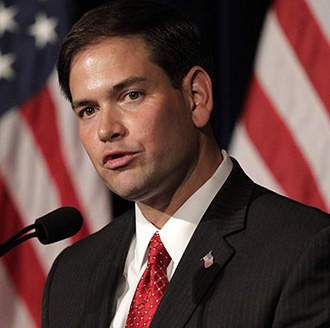Q: Did Marco Kill Obamacare?
A: You bet he did.
Congratulations, senator! I hadn’t heard this, and of course I’m devastated. But this should certainly lock up the Republican nomination for—
Hmmm? What’s that? This is a wee bit exaggerated? Here’s the story: Obamacare includes a program called “risk corridors” that’s designed to smooth out insurance company profits during the first few years of the program, when  everyone is still trying to figure how to price their plans. The key element is that companies that make less than a certain amount will be compensated. Nicholas Bagley picks up the story from there:
everyone is still trying to figure how to price their plans. The key element is that companies that make less than a certain amount will be compensated. Nicholas Bagley picks up the story from there:
The Obama administration soon came to recognize that the risk corridor program contained a serious flaw: the ACA didn’t appropriate any money to fund it….At Rubio’s insistence, Congress in 2014 passed a budget bill prohibiting the administration from using other funding streams—the budgetary equivalent of looking under the couch cushions for change—to make up for any shortfall.
Rubio’s bill has now come back to bite the administration. On October 1, HHS announced that, for 2014, health plans were owed substantially more under the risk corridor program than they paid in. Unprofitable plans will thus receive just 12.6% of what they were supposed to.
The administration hopes to make it up to these health plans…But there’s another option, one that hasn’t received much attention. When Congress creates an entitlement directly in legislation, the person who’s supposed to get the entitlement can file a lawsuit in the Court of Federal Claims to recover what she’s owed….The same principle holds (1) where Congress vests a federal agency with the power to obligate the United States to make certain payments and (2) the agency welches on those obligations. Here, the ACA instructs HHS to create a risk corridor program requiring the government to pay health plans a given amount of money. If the past is any guide, plans should be able to sue if HHS doesn’t pay them in accordance with the program. That’s so whether or not Congress has appropriated money to fund the program.
….That’s small consolation to the co-ops that needed risk corridor payments now to stay afloat. But the question for health plans isn’t whether they’ll get paid. It’s when. Marco Rubio hasn’t killed Obamacare and he hasn’t saved taxpayers any money. All he’s done is throw a wrench in the works.
A wrench is a wrench, I suppose. Republicans are fanatically opposed to poor and working-class folks getting decent health care, so anything that helps the cause should be welcome on the campaign trail—especially among the GOP’s elderly supporters, who already get government health care.
Elsewhere, Mitch McConnell is going after the really poor by promising to use reconciliation to repeal Obamacare’s Medicaid expansion. Apparently this is making some Republicans nervous, since it means taking away a benefit from their own constituents, but Ol’ Mitch says they shouldn’t worry: Obama will just veto the bill anyway. You’d almost think Congress didn’t have anything useful to do judging by the GOP’s attachment to an endless stream of symbolic legislation. Do these guys really believe that extracting a presidential veto is some kind of historic victory or something?

















